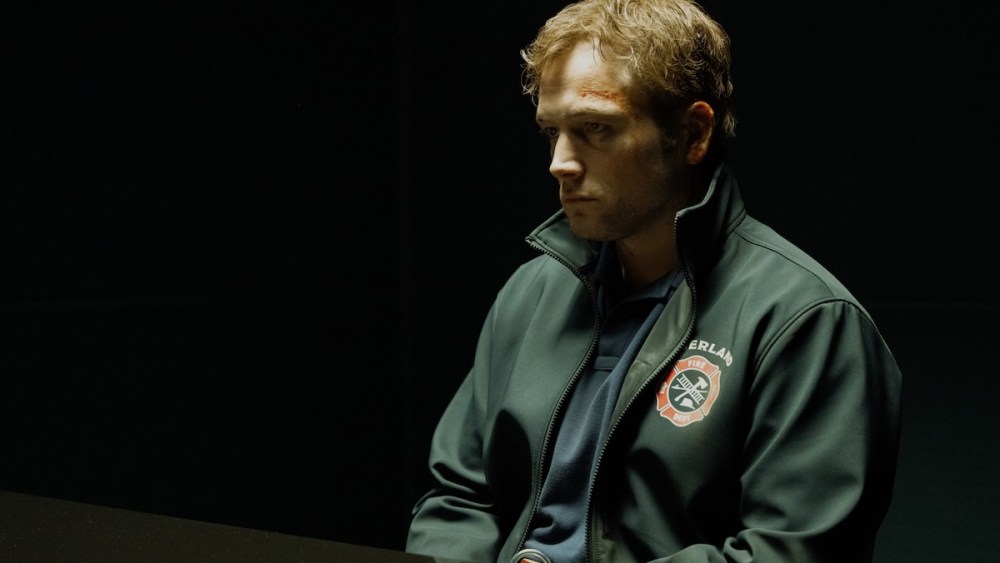SPOILER ALERT: This interview contains major spoilers from “Mirror, Mirror,” the finale of Apple TV+’s “Smoke.”
Dave Gudsen (Taron Egerton) was never the man he said he was. He may have been an arson investigator by day, but he was one of the two serial arsonists who would terrorize his Pacific Northwest town by night. He may have had aspirations of becoming a novelist, but he was practically laughed out of a publisher’s office for his bad writing. He may have seen himself as a loving husband and stepfather, but his “nice guy” persona belied his abusive nature.
And in the final minutes of the Apple TV+ drama “Smoke,” viewers come to learn that the man they’ve watched for nine episodes doesn’t actually look like Egerton (who also serves as an executive producer). While sitting opposite his former partner, Det. Michelle Calderone (Jurnee Smollett) — who had finally been able to apprehend him after spending most of the nine-part series gathering evidence of his fiery misdeeds — Gudsen’s mask finally drops in the interrogation room, revealing a man who looks markedly older and heavier staring back at himself in the mirror.
It’s an unsettling final twist that creator and showrunner Dennis Lehane fought to include in the final chapter of his fiery saga, which was inspired by the real-life case of convicted serial arsonist John Leonard Orr.
Courtesy of Apple TV+
“We hid it from Apple because we knew they’d hate it — and they did. And everybody was like, ‘What?!’ And I was like, “No, he’s projecting! That storyline is about his projection. He’s projecting who he is,’” Lehane tells Variety. “This is a guy who walked around thinking of himself as a hero, who was simultaneously running out and doing some really terrible things. To me, we’ve become victims of a type of performative persona, performative masculinity, whatever you want to call it. People are losing complete grasp with who they actually are, and Orr represented that to me.”
In a wide-ranging chat, Lehane opens up about how his personal experiences with men like Gudsen inspired his and Egerton’s latest foray into TV after their acclaimed 2022 miniseries “Black Bird,” why he was not surprised by Trump’s return to power (and why he thinks Democrats are partially to blame), the harrowing finale scene that he had to cut down in the edit — and why he believes that finale could represent either an end or a new beginning for Gudsen and Calderone.
How did you figure out what motivates Dave’s actions? What did you settle on as the root cause of his behavior?
I grew up in a hyper-masculine culture. I knew a lot of people who were incredibly full of shit and who would make incredible justifications for their own failure, so I’d had a front row seat to a lot of that for years. I hung out in a lot of the bars where guys talked about how they got shafted out of jobs because they were white. And I then moved into literary circles where you would come across the same type of guy. I remember a guy saying he lost out on a fellowship because the other person applying for the fellowship was gay, and I was like, “Did he put that on his CV? You really have gone that far down the rabbit hole of bullshit?”
I guess what I’m saying is, I’ve had a front row seat for a lot of toxic masculinity for six decades, and Dave, to me, was that guy. There’s always an excuse with him. Michelle plays a card late in the show where she says, “Huh, so you failed the psych eval,” and that was true of Orr. Orr didn’t get into the police department — that was his big axe to grind — not because he was single and white, but because he failed the psych eval. So I thought [toxic masculinity] was something to examine further as we live it now.
You have insisted in past interviews that you are not a political writer by any means, but many of the social issues you tackle in your work — including race, wealth, privilege, masculinity — can be construed in a way to make a political statement. Do you think this show has landed with viewers any differently in the current political climate with the Trump administration?
None of this goes away; it hadn’t gone away. It wasn’t like in 2020, everybody waved a wand and we’re like, “Hey, we’re sane again!” There were still a million people running around talking about January 6th as if it wasn’t an insurrection. There’s still plenty of ugly shit going on. And then you had all the anti-woke stuff. I’m with the guys on “South Park” — the woke stuff was getting a little silly when you were taking it to the extreme, but it’s a hell of a lot better than the alternative, which is where we’re going now.
And now you look at what’s happening in Washington D.C. today — it is a test run; it is a dry run. He did one in California, now he’s doing one in D.C. What’s going to happen when he decides to run for a third term? He’s already established he can send troops into American cities. That’s the reality we’re living in. So I don’t think any of this went away. I think it’s been underground for a very long time, and I think liberals and Democrats, certainly, by being out of touch with the white working class, they lost their finger on the pulse. I was not surprised by any of it. I wasn’t surprised by 2016. I wasn’t surprised by 2024. I won’t be surprised by what’s coming, because I live in those bars; I hang out with those people; I’ve spent a lot of time in their kitchens. I know how they think, and there’s a lot of rage out there.
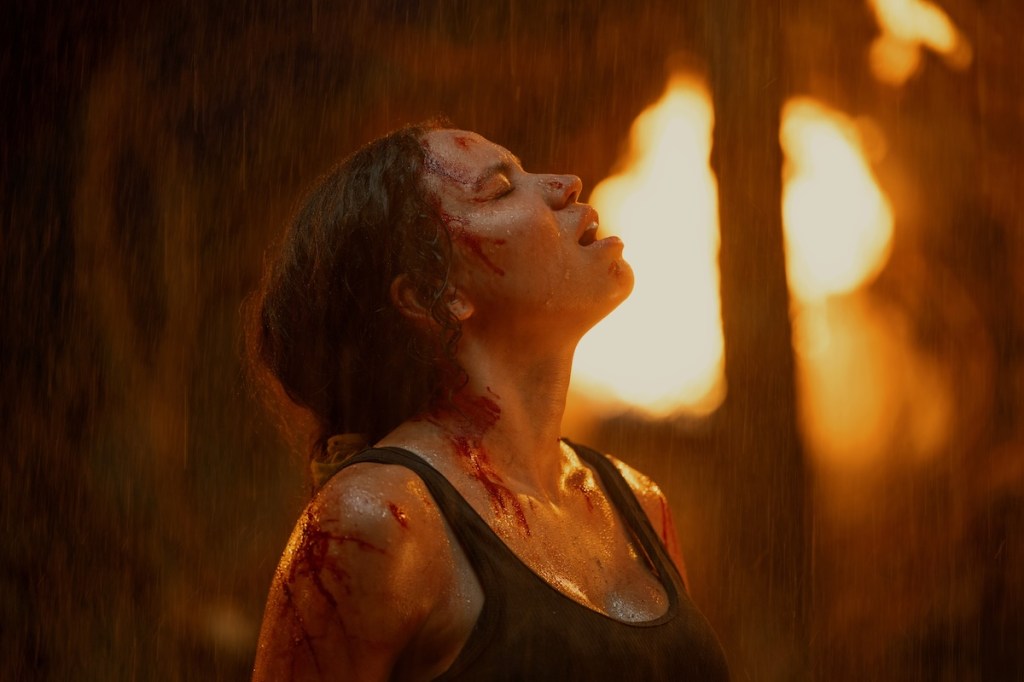
Courtesy of Robert Falconer/Apple TV+
On some fundamental level, Dave and Michelle are very much the same person. They both share self-destructive tendencies, and they each have to find ways to justify their own behavior to live with themselves. How did you think about evolving that central relationship over the course of this season?
We knew Michelle had heroic qualities, but was very much not a hero. That makes her like Dave in some ways, although Dave’s the real extreme version of it. So we started to look at Michelle in terms of her own damage, her own dysfunction, and her own denial, which is pretty prodigious. So as we progressed in the writers’ room, we kept going, “How much more extreme can we take this?” Because we are living in extreme times.
I remember the day I came in and said, “Dave is not Dave. Dave does not look like Taron Egerton.” It was pretty early, and we hid it from Apple because we knew they’d hate it — and they did. And everybody was like, “What?!” And I was like, “No, he’s projecting! That storyline is about his projection. He’s projecting who he is.”
The Freddy storyline is clearly the storyline you’ve seen from me before. My heart and soul lies in those types of stories [about] the people who are truly disadvantaged, the people who are true victims of society, who then lash out in very unfortunate and terrible ways. Once we wrapped that, we were like, “OK, the last two episodes, now that’s going to be the Michelle and Dave show. We’re going to really see how nuts these two people are and let it ring out to the very last scene.”
You mentioned Freddy — the fast-food worker arsonist played by Ntare Guma Mbaho Mwine — who uses a milk jug filled with oil as his incendiary device of choice, and who dies by suicide in the seventh episode. Dave and Freddy were both going to burn down the world for not giving them what they thought they deserved. But while they are both criminals, their circumstances could not be more different. How did you think about juxtaposing Dave and Freddy’s arcs, and how conscious were you of the role that race plays in this story?
I was 100% aware of that at all times. But I never want to write polemics. I never want to make you feel like you’re doing your homework politically or socially. I just want to tell a story about people. But I think it completely goes without saying that Freddy is the true disadvantaged one because of the color of his skin, because of his education, because of his background. It’s not like he has mommy issues. He got screwed on every single possible level as a person.
He was inspired a bit by a guy named Thomas Sweatt, who was an arsonist in Washington D.C. and shows up at the very end of the “Firebug” podcast, which is what inspired the show. I thought, “What if Thomas Sweatt was working at the same time as John Orr in the same area?” So there’s not a single misinterpretation you could make of the Freddy storyline that’s probably mistaken. We meant everything, and Ntare was game.
We were shocked that nobody brought up more the way he’s vanquished by Dave [at the end of Episode 6, when Dave gets some sick pleasure out of stopping Freddy from lighting himself and Brenda, the kind hairdresser who gave him a makeover, on fire]. In the end, it’s almost like Dave ejaculates on him. Dave gets a hard-on from it! I mean, that’s white power at its essence, and then he turns to the African American woman and says, “Don’t worry. You’re safe now.” It’s pretty brutal. All of us — me, Taron, Ntare, Adina [Porter, who played Brenda] — went to the wall on that storyline.
We knew we were telling two stories. One was the crazy story that’s kind of fun. One was the very dark and very sad story that was going to end tragically. I think that dark, tragic story is certainly a wheelhouse for me. That’s something that I obsess over. You see it in all my work — in Larry Hall in “Black Bird,” in “Small Mercies,” in “Mystic River.” But the other [storyline] was to balance that, because I don’t want to show this just like, “Oh, wow, man, life really sucks.” But for Freddy, it sure does.
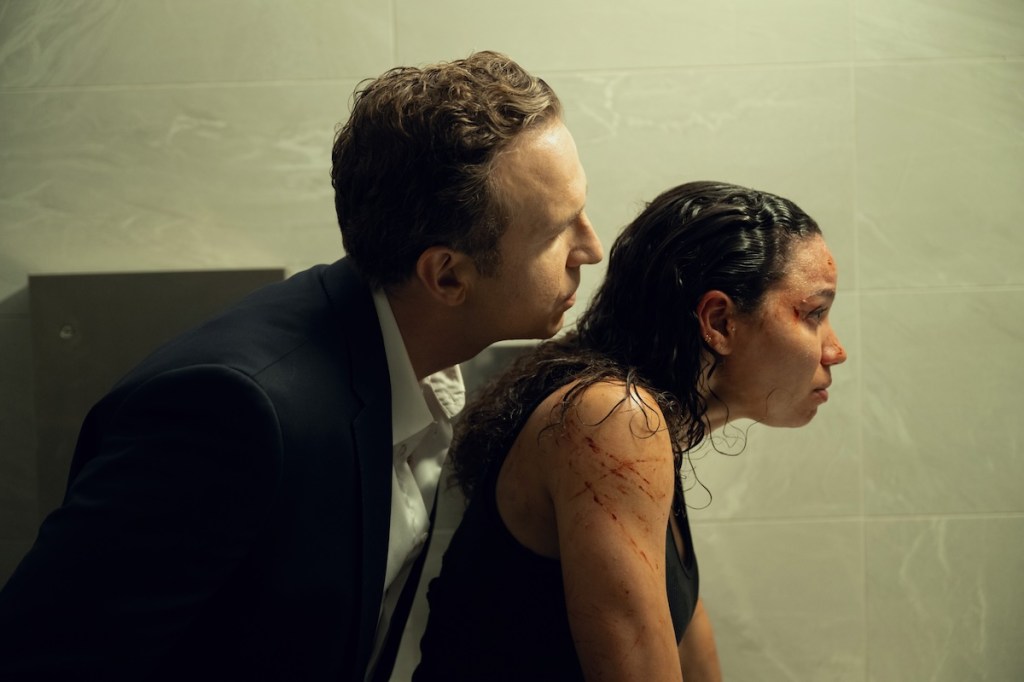
Courtesy of Robert Falconer/Apple TV+
In the penultimate episode, Michelle planted a discarded glove that Dave had left in her car at the rental house of police captain Steven Burke (Rafe Spall), whom she had accidentally killed during a heated confrontation about their ill-advised affair, before torching the place to remove any trace of her being there. How did you arrive at that final twist, and what were the most important considerations for you as you were writing the finale?
The idea was, we live in this world of non-truth — she’s not going to get him clean. She’s getting him for something that she did, not that he did. And once we came up with that, we were like, “That’s the show! That’s the story we’ve been telling since the beginning.” Dave’s looking at the TV in Episode 9, and he goes, “I’m being framed.” And then his ex-wife says to him, “Nobody says that. That doesn’t happen.” And he’s like, “No, I’m being framed!” And he’s right! We really thought, “Wouldn’t it be interesting if Dave had to try and figure out a way to dig himself out of this one?” Because he left such little physical evidence behind — and that’s the truth of arsons. They’re extremely hard to prosecute, because you burn the evidence. So we just thought it would be highly ironic.
We had to give the audience a huge fire. That’s something that we’ve been promising. The director, Joe Chappelle, and I are both Sergio Leone fans, we’re both George Miller fans, and we thought: What if we mashed up Sergio Leone and George Miller and had [the characters] driving through a fire, and then had her be catapulted from the car, turn around and come out like a true Sergio Leone hero? And instead of reaching for a gun, she reaches for a scrunchie.
I wrote the notes for this episode in a kind of fever. My assistant viewed some of it, and it’s one of the craziest things she ever saw. I went into a room and turned on the “Oppenheimer” soundtrack on a complete loop, and then I just began to envision everything and threw it up on a board. I felt like a mad scientist, but that’s where all this came from. I knew what [writer] Molly [Miller] had done in Episode 8, so I was like, “Oh, man, the gauntlet is thrown. I gotta top that.” Go big or go home was the whole point of that episode.
In the finale, when he knows Michelle is on to him, Dave tries to kill her by driving both of them straight into a wildfire, and after she survives the inevitable car accident, she is able to bring him into custody — but not before she puts a gun in his mouth and threatens to shoot him. Was there ever a version of this story where Michelle would have killed Dave or vice versa?
No. We always knew we were driving towards [that interrogation room scene]. In case it’s not brutally obvious by now, I love nothing more than two people in a room facing off against each other. So I always knew there was going to be a camera move behind Dave in the final scene that was going to reveal that he’s not the Dave you’ve been looking at for nine episodes. I always knew that was there, so it was all about just getting them in that room.
I liked the idea of her beating the ever-living shit out of him, and then his life being saved by the rain. Right up until that moment, she could kill him, and then the rain comes and washes her clean, and she says, “I’m going to walk him in. I’m going to bust him.” She probably should have killed him. If she killed him, then all questions go away.
The stuff with the gun — we trimmed that and trimmed that, because we all went so over the top with that. It was pretty brutal. That scene was so clearly a type of rape of Dave, and she was shoving that gun in and out, in and out, in and out [of his mouth]. She was showing him what it feels like to be a woman, basically, and to have no power. So we just said, “I think less equals more here.” I’d say we cut 45 seconds out of that bit. It was so long! Joe had all these incredible closeups. And I remember when I wrote it and I turned it in, my writers were like, “Uh … what’s with the face-fucking?” I was like, “Yeah, I know.” We dialed it back, but all of Michelle’s rage at every single man [in her life] — Arch Stanton, Burke, her long-gone father, her brother — comes out in that scene.
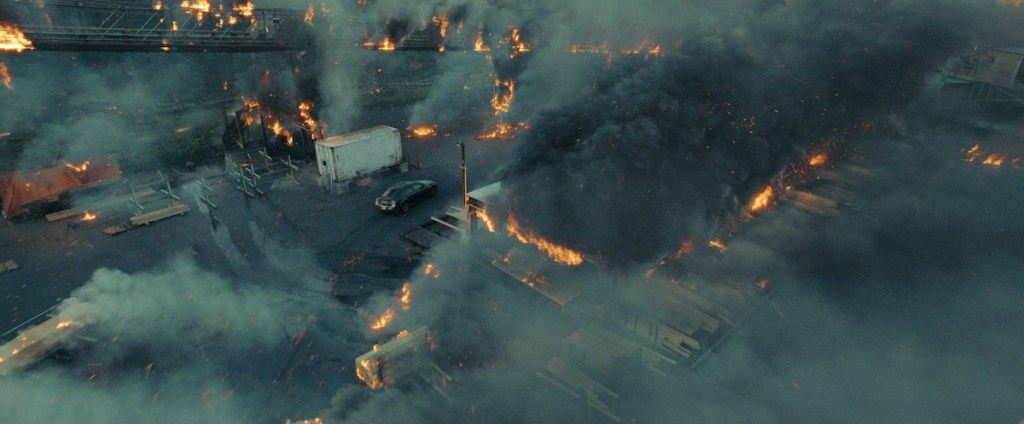
Courtesy of Apple TV+
How would you characterize that charged final look between Dave and Michelle in the interrogation room?
At first — and this is Taron’s performance — when he says, “I know who I am,” he’s shook. His persona drops. It falls away. He’s lost for a second. And that’s why you get a glimpse of [the real] him. It’s the same after his car accident. After his car accident, his wife blows him up, she breaks him down for a second. He stands up, he walks to the mirror, and he sees himself for just a second, and then he goes back into his bullshit. So when he says, “I know who I am,” at first, he says it almost hopefully. Taron lets his face settle, and then he gets this predatory look in his eyes again, and he’s Dave again, and he just says, “I know who I am.” And then Michelle says, “So do I.” And it’s the two of them looking at each other: “Now what do we do? What happens next?” Because this dance is what has been fueling them, and it ends the moment she walks out of that room, potentially.
What do you imagine happens to Dave and Michelle after the screen fades to black?
I think Dave becomes a media darling, a hero of the right, a victim. I think Dave becomes the Karen Reed of his time, and he’s going to have a whole contingent of the population who says, “This guy’s innocent. This guy was framed.” Which, in this case, they’re right! And then Michelle, what Burke’s ghost says to her is very true: “This is a flimsy story. All it takes is one person to put us together, and your whole story is going to fall apart.” So there’s a lot of grist for the mill for it to go on.
But “Smoke” was billed as a limited series. Does this mean that you are actively looking for ways to continue telling this story, or have you already let the story go?
No, we haven’t let the story go. We have plans if it were to go forward, but we don’t know if it will or won’t. So I don’t know if it’s quite … lit the world on fire. We always knew we were taking a very calculated risk with this show, because it’s not like too many things. We wanted it to be audacious, and we wanted the show to have a tonal shift within the heart of every episode. That’s a very risky thing to do in the current climate — and now I think even more so. Because I’m like everybody else, man. I just want a break from the really dark things I see in the news every day. So we always knew the show could be a tough sell. I’ve been connected to a smash hit or two — I know what it feels like — and this doesn’t feel like that. This feels like a show that’s going to need to grow its audience, and we’ll see what happens. If it goes someplace, we have a plan; we know where it can go. If it doesn’t, I’m moving on to the next thing. I did the show I wanted to do.
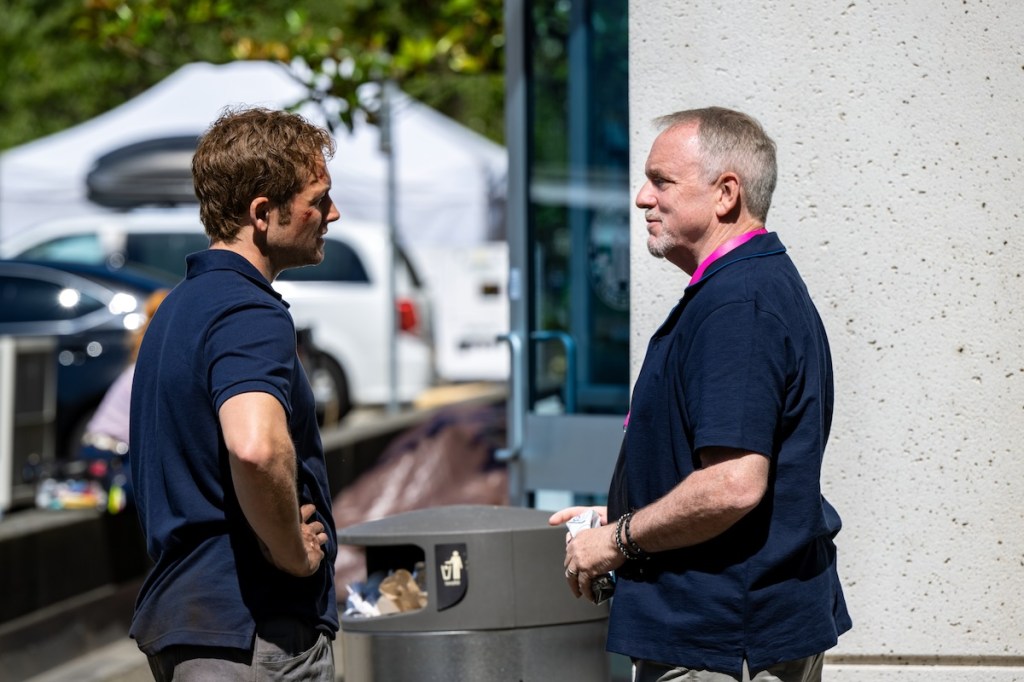
Taron Egerton and Dennis Lehane on the set of “Smoke.”
Courtesy of Robert Falconer/Apple TV+
What is next for you then? Have you and Taron discussed what your next collaboration could look like?
I think we’re both going to take a break for the next project. I don’t see a part necessarily for him in there, and he’s mulling his own possibilities. He just did this magnificent film called “She Rides Shotgun,” and the studio just dumped it, man. It’s so sad. It’s a great film, and it’s gotten great reviews. So I think Taron’s in a space where he’s just trying to figure out what his next move is. We are close friends, and we’ll get together on something else at some point for sure. He likes to do one for somebody else, and he likes to do one for me.
As a novelist, I just don’t have anything in me right now. I’m not thinking that way. If another “Small Mercies” wants to come bursting out of me, that’d be awesome. But if it doesn’t, then I’ll just keep doing [TV] because I take so much joy in the collaborative nature of this , and you don’t have that when you write a novel. You’re just alone all the time, and I’m really sick of being alone all the time.
We’ve already developed [the TV adaptation of] “Small Mercies.” There’s scripts, there’s a cast. I can’t speak to it yet. There’s a lot of questions swirling around it right now that are just way past my pay grade, and then I’ll get to it. So I have “Small Mercies” ready to go, but it’s just a matter of when. I’m waiting to see what Apple wants to send me next, because I’m under contract with them. And if they want to throw something my way, then I’m happy to work. But I have nothing to pitch right now. I really burned myself — God, these fire metaphors! — when I did “Smoke.” There was nothing left, so we’ll see what happens.
This interview has been edited and condensed.
